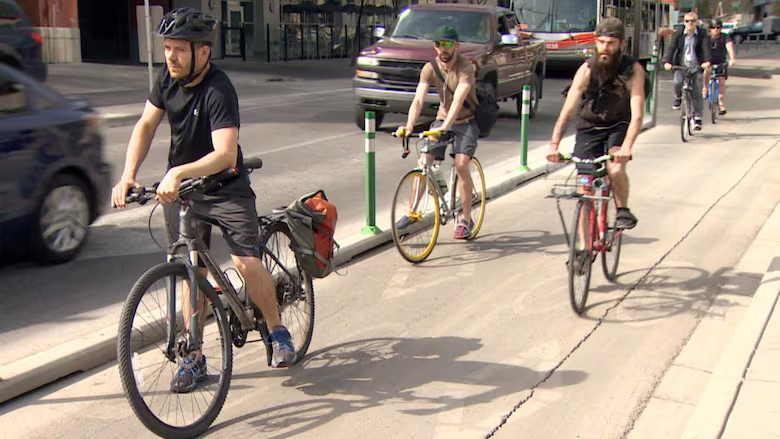Calgary bike advocates urge city to invest in infrastructure
Advocates say as pandemic measures ease, measures to give walkers and cyclists space should become permanent

Bike stores in the city say they haven't seen this kind of demand since the '70s. But those picking up cycling or dusting off their bikes amidst the pandemic are cycling in a different kind of city.
Vehicular traffic is down and has been since many offices sent workers home to help flatten the COVID-19 curve. Transit use has slowed to about 100,000 users a day, according to Calgary Mayor Naheed Nenshi.
Gary Millard, president of Bike Calgary, said it's now more comfortable than ever, even for a novice cyclist, to be on the road.
But as things begin to gear back up after the pandemic effectively shut Calgary down, advocates want to keep these novice cyclists on the road by keeping the network comfortable and easy to use.
"We're starting to realize as a society that there's lots of opportunities to convert some of this unused motor vehicle infrastructure into usable transportation networks," Millard said. "I think some of the people who've been giving [biking] a try over the past couple of months will stick with it."
Businesses are coming back online, patios are open, and according to the province, Alberta is moving toward the second phase of its economic relaunch.
With that, there will come a time when people are asked to return to work and the city's downtown offices fill up again.
Millard said when that happens, it's imperative that novice cyclists know how to safely travel through Calgary. One of the easiest ways he sees to ensure that is to invest in protected infrastructure.
Kimberley Nelson is director with Vélo Canada Bikes. She said across the country there's a discussion about what to do with space that's been opened up for active users.
In Calgary, there are more than a dozen lanes of traffic that have been blocked off for those biking and walking to use so that narrow sidewalks and pinch points in popular areas won't become a safety and public health concern.
While the pylons and barricades are very temporary — easy to put up or take down — Nelson said those who have been advocating for cycling infrastructure see a great opportunity.
But she said it comes down to the City knowing how people will need to travel as things open back up.
"It was easy to identify when we were talking about only essential services — at that point there were only a few. Now we're talking about a staged opening," Nelson said. "Where are those areas that they already know transit was heavily used prior to the pandemic?
"How can they take that information and create something that's going to be useful and intuitive and services the needs of the people who want to use that?"
In June, the federal government accelerated plans to get infrastructure money into the hands of municipalities. Nelson said that cash — and data she hopes the city has collected over the pandemic — could help add permanent infrastructure to Calgary.
"If Calgary has quiet streets and we're closing entire roadways in some spaces just to allow people to get out and ride their bikes in peace, if we maintain that, then yes people who are encouraged today to do it … are going to continue," Nelson said.